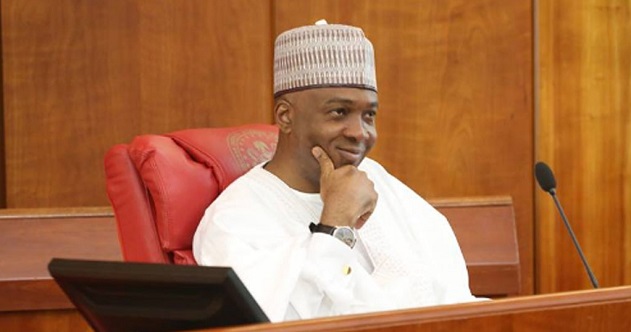Politics
PROBE: Court rescues Saraki from EFCC, ICPC, DSS

The efforts by the Senate President, Bukola Saraki, to stop his ongoing probe by the Economic and Financial Crimes Commission (EFCC) on Tuesday yielded a positive result.
A Federal High Court in Abuja has restrained the EFCC and other agencies involved in investigations into the senator’s alleged corrupt acts from going ahead with the probe.
Saraki had in the bid to stop the probe, filed two separate fundamental rights enforcement suits last Friday before the court.
He had in the suits challenged the decision of the EFCC to seize houses said to belong to him in Lagos.
Ruling on an ex parte application Saraki filed along with the substantive suit on Tuesday, Justice Taiwo Taiwo, ordered EFCC and the other five respondents to the suit to stay action on the probe pending the hearing and determination of the motion on notice filed by the applicant.
The judge’s order came after he heard the argument of Saraki’s lawyer, Sunday Onubi, who moved the application.
Aside the EFCC, other respondents to the suit are the Attorney General of the Federation, Abubakar Malami (SAN), Department of State Services (DSS), Inspector-General of Police, Muhammed Adamu, Independent Corrupt Practices and other related offences Commission (ICPC), and Code of Conduct Tribunal (CCT).
The judge in his ruling likened the restraining order to an order directing the parties to the suit to maintain the status quo in respect of the probe.
The judge further explained that he granted Saraki’s prayers to avert a situation where the court would be faced with a situation of fait accompli.
According to Justice Taiwo, granting the order was in line with a settled principle of law that once a suit was filed, all parties to it must refrain from taking any action capable of rendering the suit nugatory.
“There is no doubt that the Fundamental Rights Enforcement Procedure Rules 2009 is a special proceeding with its stated rules and procedure.
“By the provision of Order 4(3) of the Fundamental Rights Civil Procedure Rules, 2009, the court may, if satisfied that the applicant may be caused hardship before the service of an application where liberty or life of the applicant is involved hear the application ex parte upon such interim reliefs as the justice of the application may demand.
READ ALSO: Osinbajo seeks collaboration among anti-graft agencies in fight against corruption
“There is no doubt that in making the interim reliefs or orders, the court is guided even in its exercise of its discretion judicially and judiciously applied by the law and statues.
“Here comes in the rules and of course Constitution of the Federal Republic of Nigeria.
“I am of the view, after due consideration of the aforesaid averment, that this court ought to make the order being sought by the applicant pending the hearing and determination of the originating motion on notice.
“To do otherwise and not to restrain the respondents by asking them not to stay action will result in the court being faced with a fait accompli,” he said.
Join the conversation
Opinions
Support Ripples Nigeria, hold up solutions journalism
Balanced, fearless journalism driven by data comes at huge financial costs.
As a media platform, we hold leadership accountable and will not trade the right to press freedom and free speech for a piece of cake.
If you like what we do, and are ready to uphold solutions journalism, kindly donate to the Ripples Nigeria cause.
Your support would help to ensure that citizens and institutions continue to have free access to credible and reliable information for societal development.